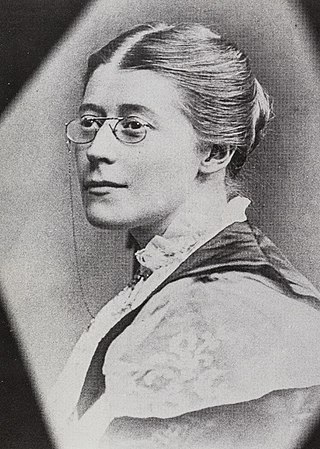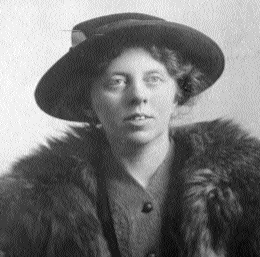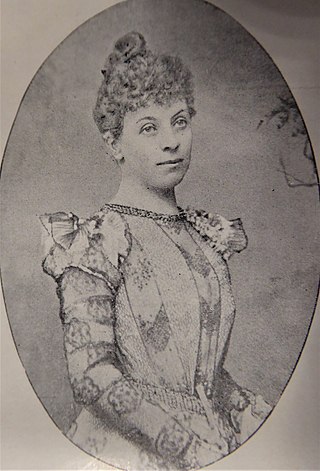Related Research Articles

Dame Millicent Garrett Fawcett was an English political activist and writer. She campaigned for women's suffrage by legal change and in 1897–1919 led Britain's largest women's rights association, the National Union of Women's Suffrage Societies (NUWSS), explaining, "I cannot say I became a suffragist. I always was one, from the time I was old enough to think at all about the principles of Representative Government." She tried to broaden women's chances of higher education, as a governor of Bedford College, London and co-founding Newnham College, Cambridge in 1875. In 2018, a century after the Representation of the People Act, she was the first woman honoured by a statue in Parliament Square.

Helena Maria Lucy Swanwick CH was a British feminist and pacifist. Her autobiography, I Have Been Young (1935), gives a remarkable account of the non-militant women's suffrage campaign in the UK and of anti-war campaigning during the First World War, together with philosophical discussions of non-violence.
The National Union of Women Suffrage Societies (NUWSS), also known as the suffragists was an organisation founded in 1897 of women's suffrage societies around the United Kingdom. In 1919 it was renamed the National Union of Societies for Equal Citizenship.

The United Procession of Women, or Mud March as it became known, was a peaceful demonstration in London on 9 February 1907 organised by the National Union of Women's Suffrage Societies (NUWSS) in which more than 3,000 women marched from Hyde Park Corner to the Strand in support of women's suffrage. Women from all classes participated in what was the largest public demonstration supporting women's suffrage seen until then. It acquired the name "Mud March" from the day's weather since incessant heavy rain left the marchers drenched and mud-splattered.

Esther Roper was a suffragist and social justice campaigner who fought for equal employment and voting rights for working-class women.

A movement to fight for women's right to vote in the United Kingdom finally succeeded through acts of Parliament in 1918 and 1928. It became a national movement in the Victorian era. Women were not explicitly banned from voting in Great Britain until the Reform Act 1832 and the Municipal Corporations Act 1835. In 1872 the fight for women's suffrage became a national movement with the formation of the National Society for Women's Suffrage and later the more influential National Union of Women's Suffrage Societies (NUWSS). As well as in England, women's suffrage movements in Wales, Scotland and other parts of the United Kingdom gained momentum. The movements shifted sentiments in favour of woman suffrage by 1906. It was at this point that the militant campaign began with the formation of the Women's Social and Political Union (WSPU).

A suffragette was a member of an activist women's organisation in the early 20th century who, under the banner "Votes for Women", fought for the right to vote in public elections in the United Kingdom. The term refers in particular to members of the British Women's Social and Political Union (WSPU), a women-only movement founded in 1903 by Emmeline Pankhurst, which engaged in direct action and civil disobedience. In 1906, a reporter writing in the Daily Mail coined the term suffragette for the WSPU, derived from suffragist, in order to belittle the women advocating women's suffrage. The militants embraced the new name, even adopting it for use as the title of the newspaper published by the WSPU.

The Kensington Society (1865–1868) was a British women's discussion society in Kensington, London, which became a group where rising suffragists met to discuss women's rights and organised the first campaigns for female suffrage, higher education and property holding.

Helen Bright Clark (1840–1927) was a British women's rights activist and suffragist. The daughter of a radical Member of Parliament, Clark was a prominent speaker for women's voting rights and at times a political realist who served as a mainstay of the 19th century suffrage movement in South West England. A liberal in all senses, Clark aided progress toward universal human brotherhood through her activities in organisations which assisted former slaves and aboriginal peoples.

The Open Christmas Letter was a public message for peace addressed "To the Women of Germany and Austria", signed by a group of 101 British suffragists at the end of 1914 as the first Christmas of the First World War approached. The Open Christmas Letter was written in acknowledgment of the mounting horror of modern war and as a direct response to letters written to American feminist Carrie Chapman Catt, the president of the International Woman Suffrage Alliance (IWSA), by a small group of German women's rights activists. Published in January 1915 in Jus Suffragii, the journal of the IWSA, the Open Christmas Letter was answered two months later by a group of 155 prominent German and Austrian women who were pacifists. The exchange of letters between women of nations at war helped promote the aims of peace, and helped prevent the fracturing of the unity which lay in the common goal they shared, suffrage for women.

Jessie Chrystal Macmillan was a suffragist, peace activist, barrister, feminist and the first female science graduate from the University of Edinburgh as well as that institution's first female honours graduate in mathematics. She was an activist for women's right to vote, and for other women's causes. She was the second woman to plead a case before the House of Lords, and was one of the founders of the Women's International League for Peace and Freedom.
St. Joan's International Alliance is a non profit women's organization. St. Joan's is a feminist Catholic organization, with a focus on women's equality. It is named after St. Joan of Arc. The organization has played a major role in influencing the ordination of women and general human rights. Their mission is "to secure the political, social and economic equality between men and women and to further the work and usefulness of Catholic women as citizens".

Catherine Elizabeth Marshall was a suffragist and campaigner against conscription during the First World War. She moved from women's votes to peace and worked in Geneva supporting the League of Nations.

The Liverpool Women's Suffrage Society was set up in 1894 by Edith Bright, Lydia Allen Booth and Nessie Stewart-Brown to promote the enfranchisement of women. The society held its first meeting in a Liverpool temperance hall, with Millicent Fawcett, head of the National Union of Women's Suffrage Societies (NUWSS), as its guest speaker. The society set up headquarters in Lord Street. The group became affiliated with the NUWSS in 1898, it held meetings in cafés which included talks, poetry and dance recitals. Members were recruited from prominent members of society and they distanced themselves from working class suffrage societies such as Women's Social and Political Union (WSPU).

Women's suffrage in Wales has historically been marginalised due to the prominence of societies and political groups in England which led the reform for women throughout the United Kingdom. Due to differing social structures and a heavily industrialised working-class society, the growth of a national movement in Wales grew but then stuttered in the late nineteenth century in comparison with that of England. Nevertheless, distinct Welsh groups and individuals rose to prominence and were vocal in the rise of suffrage in Wales and the rest of Great Britain.
Sarah Dickenson OBE was a British trade unionist and feminist activist.
This is an overview of Women's Suffrage activism and local politics as experienced in Leigh, Lancashire between 1900 and 1914.
Jessie Cunningham Methven was a Scottish campaigner for women's suffrage. She was honorary secretary of the Edinburgh National Society for Women's Suffrage from the mid 1890s until 1906. She subsequently joined the more militant Women's Social and Political Union and described herself as an "independent socialist".

Bertha Mason (1855–1939) was an English suffragist and temperance campaigner born in Ashton-under-Lyne. Influenced by her father Hugh Mason, a Member of Parliament for the Liberal Party, she became a dedicated activist, serving as a committee member in many groups including the National Union of Women's Suffrage Societies and National Council of Women of Great Britain. Her book The Story of the Women Suffrage Movement was published in 1912. After serving in the British Committee of the French Red Cross in the First World War, she resumed her activism with the Women's Local Government Society and joined the National Council of Women of Great Britain. She died in London.

The Common Cause was a weekly publication that supported the National Union of Women's Suffrage Societies first published on 15 April 1909 mainly financed by Margaret Ashton. Its last issue was published on Friday, 30 January 1920, in which it announced its successor The Woman's Leader.
References
- ↑ Sally Mitchell (6 August 2012). Victorian Britain (Routledge Revivals): An Encyclopedia. Routledge. pp. 93–. ISBN 978-1-136-71617-1.
- ↑ "The Manchester Society for women's suffrage" , retrieved 24 February 2015– via National Archives
- ↑ Historic England, "The former office of the MNSWS (1514262)", Research records (formerly PastScape), retrieved 17 June 2016